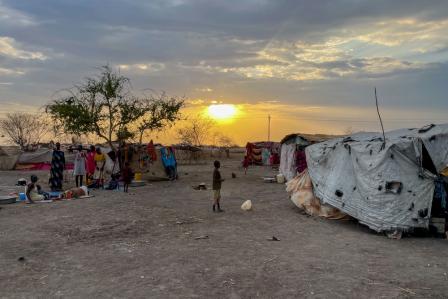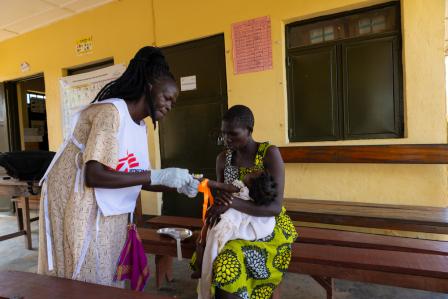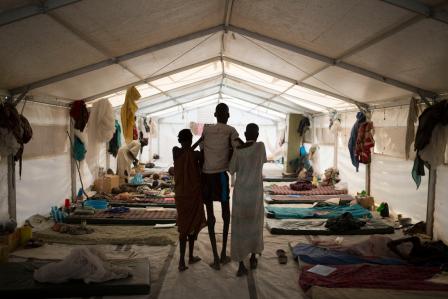Measles in South Sudan: People escaping conflict in Sudan face new health crisis
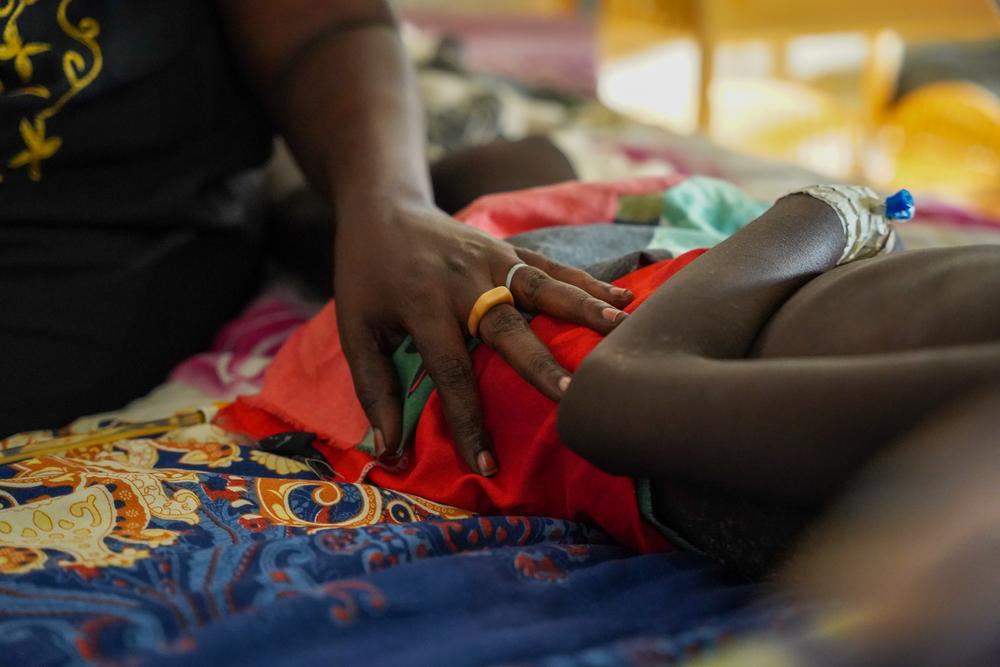
An aunt calms her 9-year-old niece as she is admitted to the paediatric ward for other medical complications after recovering from measles at Doctors Without Border hospital in displacement camp in Bentiu, Unity state. South Sudan, July 2023. © Nasir Ghafoor/MSF
Doctors Without Borders / Médecins Sans Frontières (MSF) teams are recording a concerning rise in measles and malnutrition cases in the organization’s facilities in South Sudan, particularly amongst returnees fleeing conflict from Sudan and host communities.
Doctors Without Borders medical facilities in Upper Nile, Unity, Northern Bahr El Ghazal and Warrap states are receiving patients, especially children below five years old, suffering from measles and other critical conditions. As more returnees are arriving at various border locations, Doctors Without Borders calls on donors and humanitarian actors to urgently improve the surveillance system and scale up the response from the points of entry to the places of resettlement, to ensure dignified conditions for the displaced people and host communities.
Measles and nutritional responses must be reinforced immediately. Screening and catch-up vaccination at points of entry must be extended to 24/7. Equally, mobile vaccination teams must be deployed in transit, reception sites and within host communities to ensure continuous screening and catch-up vaccination for new arrivals that have been missed at the border. Community surveillance must be strengthened to prevent the further spread of measles.Mohammad Ibrahim, Head of Mission
Since eruption of the conflict, over 200,000 individuals have been registered crossing to South Sudan as of first week of August. Over ninety per cent of them are South Sudanese, arriving exhausted and extremely vulnerable. These people, mostly women and children, are either spread across the country struggling to integrate themselves to the communities, or at transit centres close to the border; in both cases requiring essential services such as healthcare, access to clean water and sanitation infrastructure, food and non-food items, protection, and shelter.
“We are in a terrible situation. There is no food. We are living under the trees”, says Nyakiire Nen, whose two-year-old daughter is under treatment for measles at the Doctors Without Borders hospital in Bentiu Internally Displaced People (IDP) camp in Unity state.
In view of the alarming influx of the measles patients in Renk and Bentiu, Doctors Without Borders teams have set up dedicated isolation wards, while the capacity of Doctors Without Borders facilities are expanded to treat more patients in Aweil, Leer and Malakal.
In Twic County, Doctors Without Borders supported the establishment and equipment of a 25-bed-measles isolation centre at Mayen Abun Hospital, while supporting the training of frontline healthcare workers on case definition, identification and management of measles in eight primary health care centres across the County.
In Upper Nile state, Renk is the busiest entry point to South Sudan for those escaping the conflict, many originating from White Nile state, Sudan, where in the past month, Doctors Without Borders teams have identified over 1,300 suspected measles cases. Since 20th June 2023, the isolation ward set up by Doctors Without Borders in Renk County hospital has received 317 patients, more than 75% being returnees. The young ones are the most affected, with more than 80% of the patients being children under four years. Less than 15% of them were ever vaccinated against measles. As these returnees are living together in congested transit centers and travelling in large numbers on crowded trucks or boats, the spread of the disease is enormous.
In Paloich, Doctors Without Borders launched a three-week emergency intervention on 27th July 2023, focusing on addressing the health and nutrition needs of over 3000 persons residing in the returnees' camp.
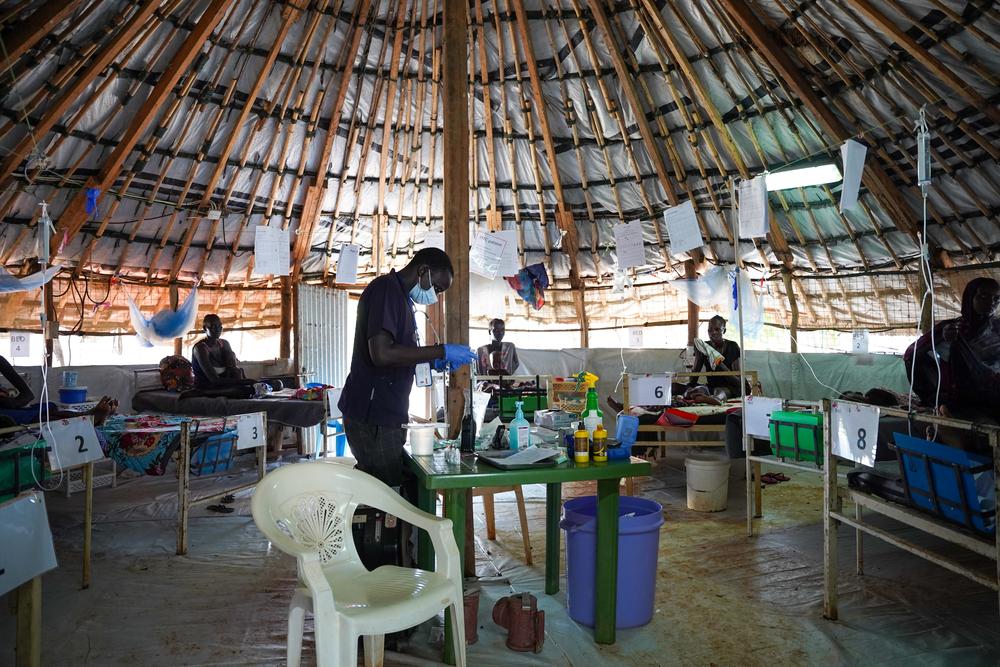
A view of the measles isolation ward in the Doctors Without Borders hospital in displacement camp in Bentiu, Unity state. In response to an influx of the patients in July 2023, Doctors Without Borders expanded the bed capacity of the isolation ward from 10 to 25 beds. South Sudan, July 2023. © Nasir Ghafoor/MSF
“My children were healthy when we were in Khartoum. But on the way, they started having diarrhea and becoming weak. We were drinking river water in Malakal, and the color of it was almost red. When we were moving with the boat from Malakal to Bentiu, the children started having symptoms of measles”, Martha Nyariek speaks of her one-year-old daughter Nyageng Mawich and three-year-old son Bol Mawich, who are amongst the hundreds of patients that Doctors Without Borders medical teams have been treating in Unity state.
In Malakal, the humanitarian situation of returnees in Bulukat Transit Camp remains dire and exacerbated by lack of sufficient food and movements to their final destination. They come in large numbers with many sick people, particularly children. A constant increase of malnutrition cases is being recorded in Doctors Without Borders facilities. Doctors Without Borders has started a mobile clinic in the transit camp, while the Doctors Without Borders hospital – the only secondary level healthcare facility for children – is working beyond its bed capacity. Similarly, the Doctors Without Borders hospital in Aweil has witnessed a 65% increase in malnutrition cases in the first six months of 2023, compared to the same period last year.
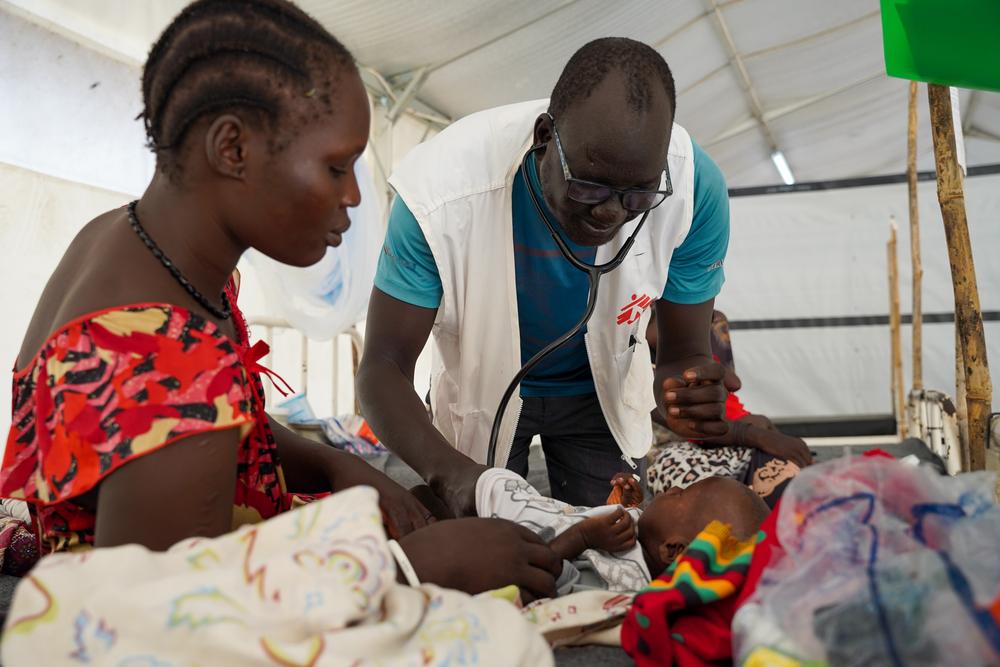
Doctors Without Borders medical doctor examines a child admitted to the measles isolation ward at our medical facility in Leer County, Unity state. South Sudan, July 2023. © Nasir Ghafoor/MSF
“If a child is malnourished, it is easier to be infected by measles and there is a higher risk of death”, says Ran Jalkuol, a Doctors Without Borders medical doctor. “Most of our patients are children who are unvaccinated. To prevent measles from taking more lives, there is an urgent need to scale up food support and to conduct catch-up vaccination to immunize everyone, especially returnees of age from six months and above. Children between six months and four years old are the most vulnerable.”
South Sudan is already prone to regular measles outbreaks. In 2022, two measles outbreaks were declared by South Sudan’s health authorities, with the latter affecting all the states and administrative areas. The influx of returnees and growing cases of measles among displaced population and host communities is another burden on a healthcare system that is already inadequate to meet the needs.

